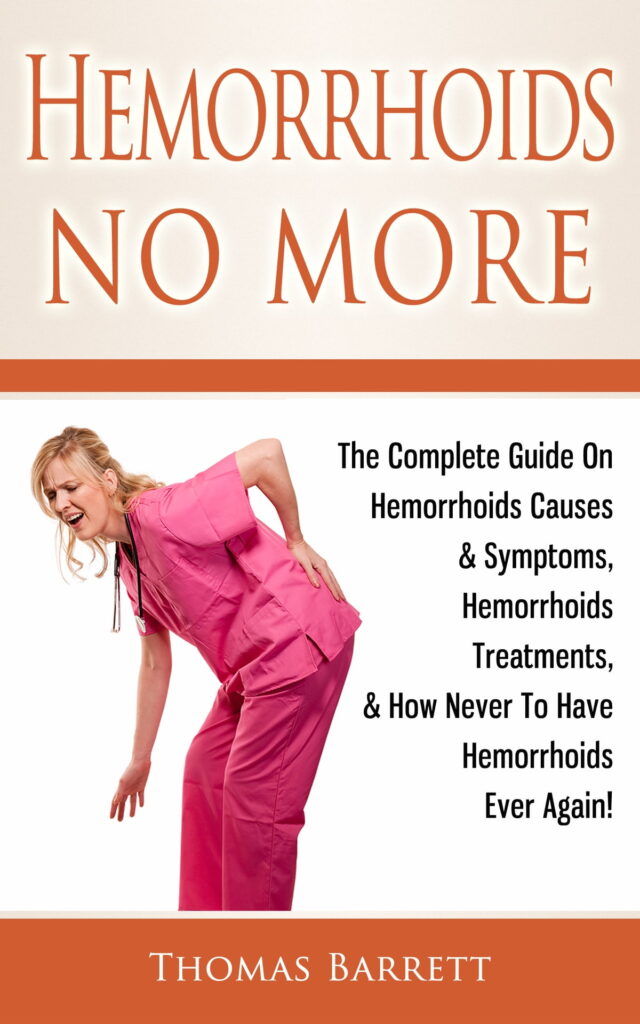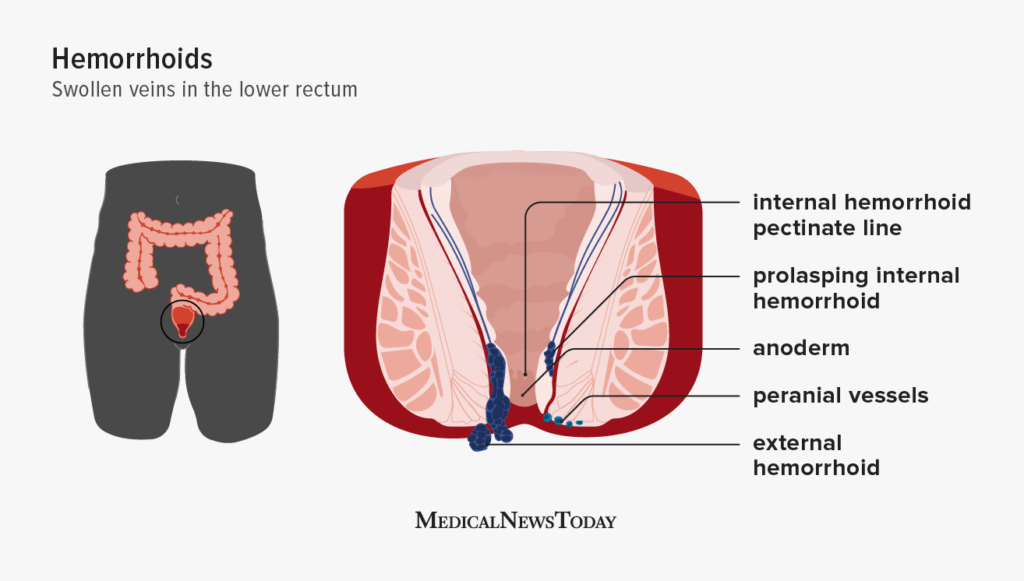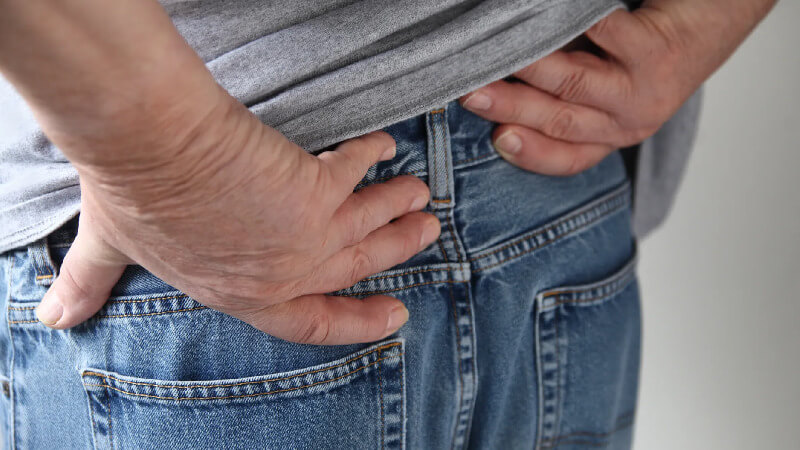As an Amazon Associate I earn from qualifying purchases.
Introduction
Hemorrhoids are a common condition that affects many people. They occur when the veins around the anus or rectum become swollen and inflamed. This can be a painful condition that can cause discomfort and irritation. It’s important to understand the causes of hemorrhoids so that you can prevent them from happening or take steps to treat them if they do occur.
Understanding Hemorrhoids
Hemorrhoids can be caused by a number of factors such as pregnancy, obesity, straining during bowel movements, sitting for long periods, and a low fiber diet. They can also be genetic, meaning that if your family members have had hemorrhoids, you may be more likely to get them as well.
Importance of Knowing the Causes of Hemorrhoids
Knowing the causes of hemorrhoids is important so that you can take steps to prevent them from happening. This may include making dietary changes, exercising more frequently, and avoiding activities that may cause hemorrhoids to develop. You may also need to seek medical treatment if your hemorrhoids become severe or do not respond to other forms of treatment.
understanding the causes of hemorrhoids can help you prevent and treat this common condition. By taking steps to maintain good bowel health and practicing healthy habits, you can reduce your risk of developing hemorrhoids and maintain optimal health.

Causes of Hemorrhoids
If you’re suffering from hemorrhoids, you’re not alone. Hemorrhoids are a common condition that affects millions of people worldwide. They occur when the veins in the rectum and anus become swollen and inflamed, leading to uncomfortable symptoms such as itching, pain, and bleeding. But what causes them? In this guide, we’ll explore the various internal and external factors that can contribute to the development of hemorrhoids.
Internal Factors
Many internal factors can contribute to the development of hemorrhoids, including:
Pregnancy and Childbirth
Pregnancy and childbirth can put a lot of stress on your body, including your pelvic region. The increased pressure on your veins can cause them to swell and become inflamed, leading to hemorrhoids.
Chronic Constipation
Straining during bowel movements can also lead to hemorrhoids. Chronic constipation can cause you to strain excessively, leading to the development of hemorrhoids over time.
Obesity and Poor Diet
Being overweight and consuming an unhealthy diet can also contribute to the development of hemorrhoids. A lack of physical activity and a diet high in processed foods can contribute to chronic constipation and inflammation, leading to hemorrhoids.
Sedentary Lifestyle
A sedentary lifestyle can also contribute to hemorrhoids. Sitting for long periods can put pressure on your pelvic region and cause your veins to swell.
By understanding the internal and external factors that can contribute to hemorrhoids, you can take steps to prevent them from developing. Maintaining a healthy weight, staying active, eating a healthy diet, and practicing good hygiene can all help to reduce your risk of developing hemorrhoids. Hemorrhoids, also known as piles, are swollen veins in the rectum and anus. They can be painful and itchy, but are usually not serious. However, they can cause discomfort and affect your quality of life. There are several factors that can contribute to the development of hemorrhoids.
External Factors
There are external factors that can contribute to the formation of hemorrhoids. These factors include:
Straining During Bowel Movements
Straining during bowel movements is a significant factor in the development of hemorrhoids. This puts pressure on the veins in the rectum and anus, causing them to swell and become painful.
Prolonged Sitting or Standing
Prolonged sitting or standing can increase the pressure in the veins around the anus and rectum, leading to hemorrhoids.
Excessive Lifting
Excessive lifting can increase intra-abdominal pressure, causing the veins around the anus to swell. This can result in hemorrhoids.
Anal Intercourse
Anal intercourse can cause trauma to the anal area, leading to the formation of hemorrhoids.
there are various external factors that can cause the development of hemorrhoids. Straining during bowel movements, prolonged sitting or standing, excessive lifting, and anal intercourse are some of the factors that can contribute to the development of hemorrhoids. Understanding these factors can help in preventing and managing hemorrhoids.
Medical Conditions
Hemorrhoids are a common health issue, but do you know what triggers them? Various medical conditions could lead to bleeding and discomfort in the anal area. Here, we provide an overview of which diseases might cause hemorrhoids.
Inflammatory Bowel Disease
Inflammatory bowel disease (IBD) includes Crohn’s disease and ulcerative colitis, which are chronic conditions of the digestive tract. IBD is characterized by inflammation and ulcers in the intestinal lining. In severe cases, this inflammation could extend to the anus and rectum, leading to anal fissures and hemorrhoids.
Cirrhosis and Liver Disease
Cirrhosis is a condition marked by scarring of the liver tissue, typically caused by long-term alcohol consumption or hepatitis. Liver disease could also cause blood clotting, which could make it challenging for blood to flow from the lower part of the body and lead to hemorrhoids.
Heart Disease and High Blood Pressure
When the heart struggles to pump blood throughout the body, it could cause blood to pool in the veins in the lower body. This condition is called venous insufficiency and may lead to hemorrhoids. High blood pressure could also cause tiny blood vessels to bulge, leading to hemorrhoids.
Tumors in the Pelvic Area
Tumors in the pelvic area could press against the veins that carry blood from the anus and rectum, leading to increased pressure and hemorrhoids. If you suspect that you have hemorrhoids caused by tumors, it is crucial to seek medical attention immediately.
Knowing which medical conditions could cause hemorrhoids is the first step in preventing and treating this condition. Speak to your healthcare provider if you suspect that you have hemorrhoids.

Genetics
Hemorrhoids are a common problem that affects many people. While there are many causes of hemorrhoids, genetics is often a contributing factor. Your genetics can play a significant role in whether or not you develop hemorrhoids. In this section, we will explore the genetics behind hemorrhoids and how it can affect you.
Familial History of Hemorrhoids
If your family has a history of hemorrhoids, you’re more likely to develop them as well. This is because genetics can play a significant role in the development of hemorrhoids. If someone in your family has had hemorrhoids, it’s important to be aware of the symptoms so that you can recognize them early on.
Hereditary Hemorrhagic Telangiectasia
Another genetic condition that can cause hemorrhoids is hereditary hemorrhagic telangiectasia. This is a genetic disorder that affects the blood vessels in the body. If you have this condition, you may have an increased risk of developing hemorrhoids.
Congenital Anal Stenosis
Congenital anal stenosis is another genetic condition that can cause hemorrhoids. This condition is characterized by a narrow anal canal, which can make bowel movements difficult. Straining during bowel movements can lead to the development of hemorrhoids.
genetics can play a significant role in the development of hemorrhoids. If you have a family history of hemorrhoids or a genetic condition that increases your risk, it’s important to be aware of the symptoms and take steps to prevent them.

Prevention and Management
Now that you know the causes of hemorrhoids, it’s time to focus on preventing and managing them. Hemorrhoid symptoms can range from mild to severe. Common signs include itching, pain, discomfort, bleeding, and swelling.
Symptoms of Hemorrhoids
If you experience any of the symptoms above, it’s best to consult with your healthcare provider. Depending on the severity of your hemorrhoids, they may recommend lifestyle changes, over-the-counter treatments, or even surgical options.
Lifestyle Changes to Prevent Hemorrhoids
In many cases, simple lifestyle changes can help prevent hemorrhoids from developing or worsening. This includes eating a high-fiber diet, staying hydrated, practicing good hygiene, and exercising regularly. Additionally, it’s important to avoid sitting for extended periods of time and to limit straining during bowel movements.
Over-the-Counter Treatments and Medications
Over-the-counter treatments and medications can provide relief for mild to moderate hemorrhoid symptoms. Options include creams, ointments, suppositories, and sitz baths. However, it’s important to speak with your healthcare provider before trying any new treatments.
Surgical Options for Severe Hemorrhoids
If your hemorrhoids are severe, your healthcare provider may recommend surgical options. This can include rubber band ligation, sclerotherapy, or hemorrhoidectomy. These procedures can provide long-lasting relief, but do carry some risks and potential complications.
By making some simple lifestyle changes and seeking appropriate treatment when needed, you can effectively prevent and manage hemorrhoids. Remember to always speak with your healthcare provider before trying any new treatments.
Conclusion
Hemorrhoids are a common condition that affects many people. They can be caused by a variety of factors, including straining during bowel movements, pregnancy, and a sedentary lifestyle. However, there are many ways to prevent and treat hemorrhoids.
Summary of Key Points
In this comprehensive guide, we’ve covered the basics of hemorrhoids, including their definition, symptoms, and causes. We’ve also discussed the different types of hemorrhoids and the various treatment options available.
Importance of Seeking Medical Advice
If you’re experiencing symptoms of hemorrhoids, it’s important to seek medical advice. Your healthcare provider can help you determine the underlying cause of your hemorrhoids and provide you with personalized treatment options.
Encouragement for Lifestyle Changes
In addition to seeking medical advice, there are several lifestyle changes you can make to prevent hemorrhoids from occurring or recurring. These include maintaining a healthy diet, staying hydrated, and exercising regularly. You can also try to avoid prolonged periods of sitting or standing.
Remember, with the right treatment and lifestyle changes, you can manage your hemorrhoids and live a comfortable life. Don’t be afraid to talk to your healthcare provider about any concerns or questions you may have.
Amazon and the Amazon logo are trademarks of Amazon.com, Inc, or its affiliates.
